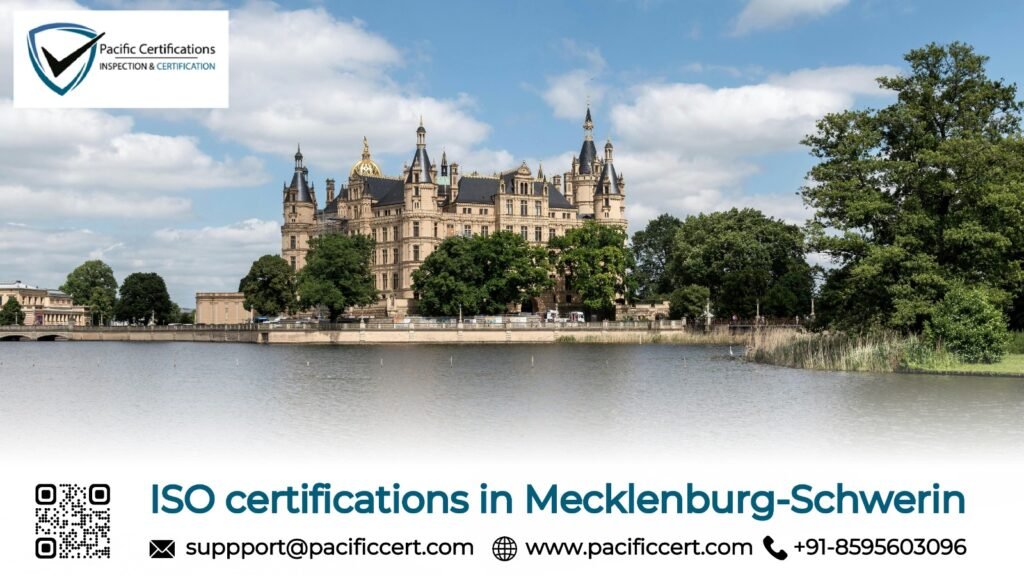
ISO Certifications in Mecklenburg-Schwerin and How Pacific Certifications can help
Mecklenburg-Schwerin, a historic region in northern Germany, is home to a diverse array of industries ranging from manufacturing to services. In today’s competitive business environment, achieving ISO certification is a significant milestone that demonstrates a commitment to quality, environmental responsibility, and occupational health and safety.
In the recent time, the global market for ISO certifications continues to grow, driven by an increasing emphasis on quality, sustainability, and safety. Research indicates that more organizations are seeking ISO certifications to enhance their market competitiveness and meet regulatory requirements.
In Mecklenburg-Schwerin, industries are aligning with these trends by adopting ISO standards to improve their operational efficiency, reduce environmental impact, and ensure the safety and security of their processes and data.
Applicable ISO Standards
ISO 9001:2015 – Quality Management Systems
This standard is essential for organizations looking to demonstrate their ability to consistently provide products and services that meet customer and regulatory requirements. It is applicable to any organization, regardless of size or industry.
ISO 14001:2015 – Environmental Management Systems
ISO 14001 helps organizations improve their environmental performance through more efficient use of resources and reduction of waste. This standard is crucial for businesses in Mecklenburg-Schwerin aiming to enhance their sustainability practices.
ISO 45001:2018 – Occupational Health and Safety Management Systems
This standard provides a framework for improving employee safety, reducing workplace risks, and creating better, safer working conditions. It is vital for companies committed to protecting their workforce.
ISO 27001:2022 – Information Security Management Systems
ISO 27001 is designed for organizations that want to establish, implement, maintain, and continually improve an information security management system.
ISO 22000:2018 – Food Safety Management Systems
This standard is applicable to any organization in the food chain, from farm to fork. It ensures food safety through the implementation of effective control measures and practices.
ISO 50001:2018 – Energy Management Systems
ISO 50001 supports organizations in all sectors to use energy more efficiently, through the development of an energy management system.
Click here to find out more applicable standards to your industry
How we can help
Pacific Certifications is dedicated to assisting organizations in Mecklenburg-Schwerin in achieving their ISO certification goals. We specialize in auditing and certification services, ensuring that your organization meets the stringent requirements of various ISO standards. Here’s how we can help:
Comprehensive Auditing Services
Our experienced auditors conduct thorough assessments to ensure your organization complies with the applicable ISO standards. We provide a detailed audit report highlighting areas of compliance and opportunities for improvement.
Certification Issuance
Upon successful completion of the audit, we issue the ISO certification, signifying that your organization meets the highest standards of quality, environmental management, health and safety, or information security.
Continual Improvement Support
We offer ongoing surveillance audits to help your organization maintain its certification status and continually improve its management systems.
Embrace the future of quality, environmental stewardship, and safety with us as your trusted certification body. Let us help you navigate the path to ISO certification and beyond, contact us today to know more!
Requirements of ISO Certifications in Mecklenburg-Schwerin
Achieving ISO certification in Mecklenburg-Schwerin involves meeting the specific requirements of the applicable ISO standards.
Here are the key requirements:
ISO 9001:2015 – Quality Management Systems
- Understand the internal and external issues that can impact the quality management system and identify the needs and expectations of interested parties.
- Top management must demonstrate leadership and commitment to the quality management system, establish a quality policy, and assign roles and responsibilities.
- Identify risks and opportunities, set quality objectives, and plan actions to address them.
- Ensure necessary resources, including competent personnel, infrastructure, and a suitable work environment. Maintain documented information to support the operation of processes.
- Plan, implement, and control processes to meet quality requirements. Manage changes effectively and ensure consistent product/service delivery.
- Monitor, measure, analyze, and evaluate the quality management system’s performance. Conduct internal audits and management reviews.
- Identify nonconformities, take corrective actions, and continually improve the quality management system.
ISO 14001:2015 – Environmental Management Systems
- Establish an environmental policy that reflects the organization’s commitment to environmental management.
- Identify environmental aspects and impacts, determine legal and other requirements, and set environmental objectives and planning actions.
- Ensure availability of resources, competence, awareness, and communication. Maintain documented information required by the standard.
- Plan and control operations that can have significant environmental impacts. Establish emergency preparedness and response procedures.
- Monitor, measure, analyze, and evaluate environmental performance. Conduct internal audits and management reviews.
- Take corrective actions and continually improve the environmental management system.
ISO 45001:2018 – Occupational Health and Safety Management Systems
- Top management must show leadership and commitment to the OH&S management system. Ensure worker participation and consultation.
- Identify hazards, assess risks, and determine opportunities for improvement. Set OH&S objectives and plan actions to achieve them.
- Provide necessary resources, ensure worker competence, and maintain awareness and communication. Document information as required.
- Plan, implement, and control operational processes to manage OH&S risks. Establish emergency preparedness and response procedures.
- Monitor, measure, analyze, and evaluate OH&S performance. Conduct internal audits and management reviews.
- Take corrective actions for nonconformities and continually improve the OH&S management system.
ISO 27001:2022 – Information Security Management Systems
- Determine internal and external issues relevant to information security, understand the needs of interested parties, and define the scope of the ISMS.
- Top management must demonstrate leadership and commitment to information security, establish an information security policy, and assign roles and responsibilities.
- Identify risks and opportunities, establish information security objectives, and plan actions to address them.
- Ensure the availability of resources, competence, awareness, and communication. Maintain documented information required by the standard.
- Plan, implement, and control information security processes. Manage changes and document the results.
- Monitor, measure, analyze, and evaluate the ISMS’s performance. Conduct internal audits and management reviews.
- Identify nonconformities, take corrective actions, and continually improve the ISMS.
ISO 22000:2018 – Food Safety Management Systems
- Understand internal and external issues, needs of interested parties, and define the scope of the FSMS.
- Demonstrate leadership and commitment to food safety, establish a food safety policy, and assign roles and responsibilities.
- Identify risks and opportunities, establish food safety objectives, and plan actions to address them.
- Ensure the availability of resources, competence, awareness, and communication. Maintain documented information required by the standard.
- Plan, implement, and control food safety processes. Establish a hazard control plan and manage changes.
- Monitor, measure, analyze, and evaluate the FSMS’s performance. Conduct internal audits and management reviews.
- Identify nonconformities, take corrective actions, and continually improve the FSMS.
We can help organizations in Mecklenburg-Schwerin to achieve their ISO certification goals and stay ahead in a competitive market. Our commitment to quality and integrity ensures that your certification process is thorough, transparent, and aligned with international standards.
Achieve excellence with Pacific Certifications – your trusted partner for ISO certification in Mecklenburg-Schwerin, contact us today!
Benefits of ISO Certifications in Mecklenburg-Schwerin
ISO certifications are internationally recognized standards which help businesses to improve their operational efficiency, meet regulatory requirements and enhance customer satisfaction.
Here are some key benefits of obtaining ISO certifications in Mecklenburg-Schwerin.
- Implementing ISO 9001 helps organizations streamline their processes, leading to more efficient operations and consistent product or service quality.
- Companies can meet or exceed customer expectations, leading to increased customer satisfaction and loyalty.
- ISO 14001 helps organizations identify and comply with relevant environmental regulations, reducing the risk of non-compliance penalties.
- Implementing an environmental management system promotes the efficient use of resources, leading to cost savings and reduced environmental impact.
- ISO 45001 provides a framework for identifying and controlling health and safety risks, leading to a safer workplace for employees.
- By implementing proactive health and safety measures, organizations can reduce the number of workplace incidents and related costs.
- ISO 27001 helps organizations implement robust information security measures to protect sensitive data from breaches and cyber-attacks.
- ISO 22000 provides a systematic approach to identifying and managing food safety risks, ensuring safe food production and handling.
- Implementing an energy management system helps organizations identify areas for energy savings, leading to reduced energy costs.
We help Mecklenburg-Schwerin to achieve ISO certification and unlock numerous benefits that drive business success and sustainability.
Which industries need ISO Certifications in Mecklenburg-Schwerin
Mecklenburg-Schwerin hosts a diverse array of industries. As businesses increasingly seek to enhance their competitiveness, efficiency, and compliance with regulatory standards, ISO certifications become crucial.
Here, we explore the key industries in Mecklenburg-Schwerin that benefit from ISO certifications and the specific standards that apply to each.
Manufacturing Industry
- Improved product quality and consistency.
- Enhanced environmental performance and sustainability.
- Safer working conditions and reduced workplace accidents.
Food and Beverage Industry
- Assurance of food safety and hygiene.
- Compliance with international food safety regulations.
- Increased consumer trust and market access.
Information Technology and Services
- Robust data protection and cybersecurity measures.
- Improved service quality and customer satisfaction.
- Compliance with data protection regulations.
Healthcare and Medical Services
- Improved quality and safety of medical devices.
- Enhanced patient care and service quality.
- Compliance with healthcare regulations and standards.
Construction and Engineering
- Consistent quality in construction projects.
- Safer working conditions for construction workers.
- Improved project management and delivery.
Energy and Utilities
- Reduced energy consumption and costs.
- Improved environmental performance and sustainability.
- Enhanced regulatory compliance.
Transportation and Logistics
- Improved service quality and customer satisfaction.
- Enhanced environmental sustainability in logistics operations.
- Compliance with transportation regulations and standards.
Hospitality and Tourism
- Consistent and high-quality service delivery.
- Assurance of food safety and hygiene.
- Enhanced guest satisfaction and loyalty.
Financial Services
- Improved service quality and customer trust.
- Robust data protection and cybersecurity measures.
- Compliance with financial regulations and standards.
Pacific Certifications is dedicated to helping organizations in Mecklenburg-Schwerin achieve ISO certifications across these diverse industries. Our expertise in auditing and certification ensures that your organization meets the stringent requirements of the applicable ISO standards.
Pacific Certifications is accredited by ABIS, in case you need support with ISO certification for your business in Mecklenburg-Schwerin, please contact us at support@pacificcert.com or +91-8595603096.
FAQ: ISO Certifications in Mecklenburg-Schwerin
ISO certifications are international standards that ensure the quality, safety, efficiency, and sustainability of products and services. They are recognized globally and help organizations meet regulatory and customer requirements.
Key industries include manufacturing, food and beverage, information technology, healthcare, construction, energy, transportation, hospitality, and financial services.
ISO 9001 is a Quality Management System standard that helps organizations ensure consistent product quality and improve customer satisfaction.
ISO 14001 is an Environmental Management System standard that helps organizations improve their environmental performance, comply with regulations, and reduce waste.
ISO 45001:2018 is an Occupational Health and Safety Management System standard designed to ensure safe working conditions and reduce workplace risks.
ISO 27001 is an Information Security Management System standard that helps organizations protect sensitive data and improve cybersecurity.
ISO 22000:2018 is a Food Safety Management System standard that ensures food safety throughout the supply chain, from production to consumption.
ISO 50001 is an Energy Management System standard that helps organizations improve energy efficiency, reduce costs, and enhance sustainability.
Benefits include improved operational efficiency, enhanced customer satisfaction, better compliance with regulations, reduced risks, and a competitive edge in the market.
We offer comprehensive auditing and certification services, ensuring organizations meet the stringent requirements of ISO standards. We conduct initial certification audits, surveillance audits, and re-certification audits to help maintain compliance.
Yes, ISO certifications are recognized internationally, enabling organizations to compete in global markets and attract international customers.
Increased emphasis on quality, sustainability, and data security is driving more organizations to seek ISO certifications to improve their market competitiveness and regulatory compliance.
Read More at: Blogs by Pacific Certifications






